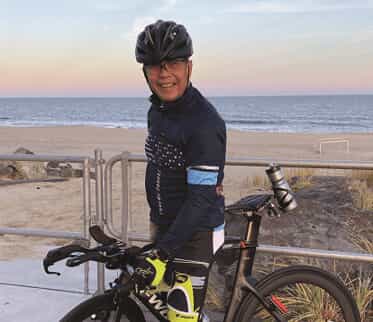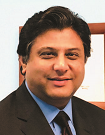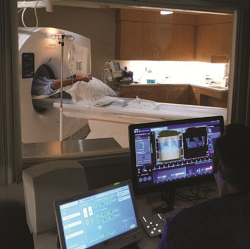"I was a walking time bomb"

Last November, doctors at Monmouth Medical Center Southern Campus (MMCSC) were getting ready to launch Fractional Flow Reserve CT (FFR-CT), a noninvasive imaging test that uses artificial intelligence software to evaluate patients with chest discomfort and symptoms that indicate heart disease.
Ray Duarte, the Director of Information Technology and Services at MMCSC and Monmouth Medical Center (MMC), was working on the project with Rajesh Mohan, MD, MBA, FACC, FSCAI, an interventional cardiologist and Chief Medical Officer at MMCSC. Dr. Mohan told Duarte that he needed volunteers to test the technology. Duarte, 51, of South Brunswick, offered to take the test. He had been experiencing back pain while cycling, and he didn’t know what was causing it.
Duarte had seen a chiropractor but didn’t experience any relief.
“Later that day, I received a phone call from Dr. Mohan,” he says. “Dr. Mohan said, ‘The good news is, the software is very accurate. The bad news is, your right coronary artery is 99 percent blocked.”
At any moment, he could have a heart attack.

Duarte was shocked.
“I was freaking out,” he recalls. “I was a walking time bomb, and I thought I was going to die. I said, ‘What do we need to do?’”
Dr. Mohan told him he needed a stent, which helps keep coronary arteries open and reduces the chance of a heart attack. Five days later, Duarte had the procedure at Robert Wood Johnson University Hospital, MMCSC’s sister hospital.
“It was painless, and I was awake the entire time,” he says.
Duarte has prescribed blood thinners, which prevent blood clots from forming in arteries and reduce the risk of a heart attack. He also was prescribed low-dose aspirin, which thins the blood and reduces the risk of a heart attack. He already takes medication for high blood pressure.
“I Felt Energized”
One week before Duarte learned he was on the brink of having a heart attack, he was taking an 80-mile bike ride to Frenchtown, Pennsylvania with friends. Initially, he thought his back pain might be related to being hunched over while cycling. Turns out, it was actually related to Duarte’s heart problem because it disappeared after the stent was placed.
Two weeks after Duarte’s procedure, he was back at work.
“I felt energized,” he recalls.
He began a cardiac rehabilitation program at MMC, where he performed strength-training exercises, rowed, walked on a treadmill and rode an Airdyne exercise bike while his heart rate and oxygen level were monitored.
"I bought an Apple watch to monitor my heart rate,” he says. “An alarm will sound if I exceed 190 beats per second.”
Duarte was supposed to participate in six months of cardiac rehabilitation, but he had to stop after five months due to the COVID-19 pandemic. He was pleased with the program.
“Staff members always reminded me about my appointments and medications,” he says.
Back to Biking
Not surprisingly, Duarte couldn’t wait to get back on his bike.
“The first thing I said was, ‘When can I ride?’” he recalls. “My physical therapist told me I could go short distances.”
Three weeks after Duarte had the stent placed, he rode 30 to 40 miles. In May, six months after the procedure, he was able to resume long bike rides. His goal was to complete a 100-mile bike ride this year, but he was sidelined after he fell off his bike and injured his shoulder over Memorial Day weekend.
“I tore my rotator cuff and shoulder tendon, and I needed surgery,” he says.
Today, Duarte has recovered and is back to training for the 100-mile bike ride. He hopes he’ll be able to do it next year. In the meantime, he’s grateful to Dr. Mohan and the FFR-CT technology.
“I swear by it, and I know other patients can benefit from it, too,” he says.
In a strange twist of fate, his life’s work— technology—saved his life.
“It’s very rewarding,” says Duarte. “I owe Dr. Mohan and FFR-CT my life.”

3 Things You Need to Know About FFR-CT
- Fractional Flow Reserve CT (FFR-CT) uses artificial intelligence software to create a three-dimensional model of a patient’s cardiac arteries. It provides information about the significance of any blockage and the blood flow through the arteries. Cardiologists use this information to develop a treatment plan.
- The noninvasive test enables physicians to determine with greater confidence and accuracy whether a patient has a significant blockage in the heart’s arteries.
- Monmouth Medical Center Southern Campus is the first hospital in the area and the fourth in New Jersey to offer this technology.
Your heart doesn’t beat just for you. Get it checked. For more information, visit Monmouth Medical Center Southern Campus Heart and Vascular Care. To make an appointment with a cardiac specialist, call (888) 724-7123.